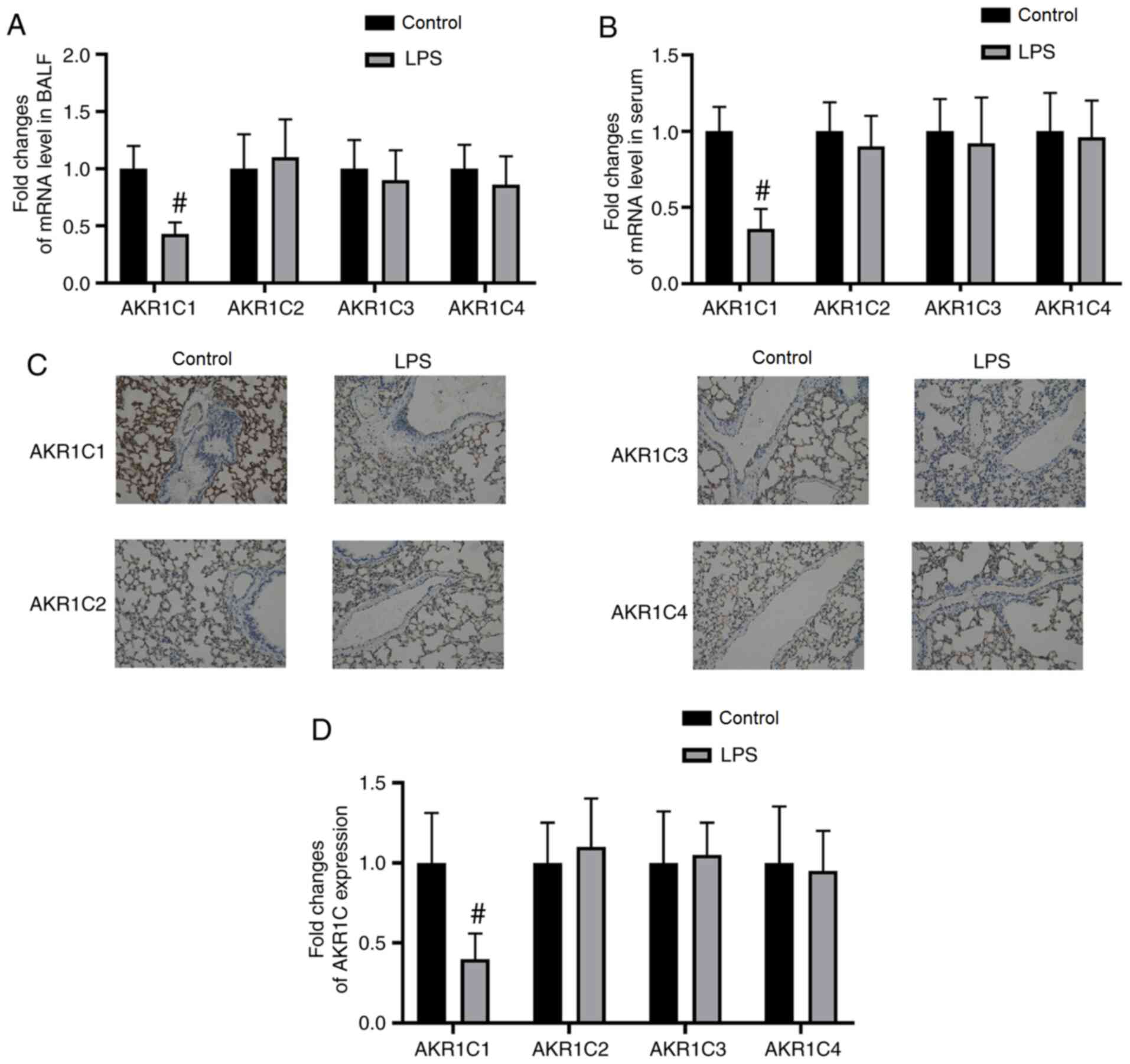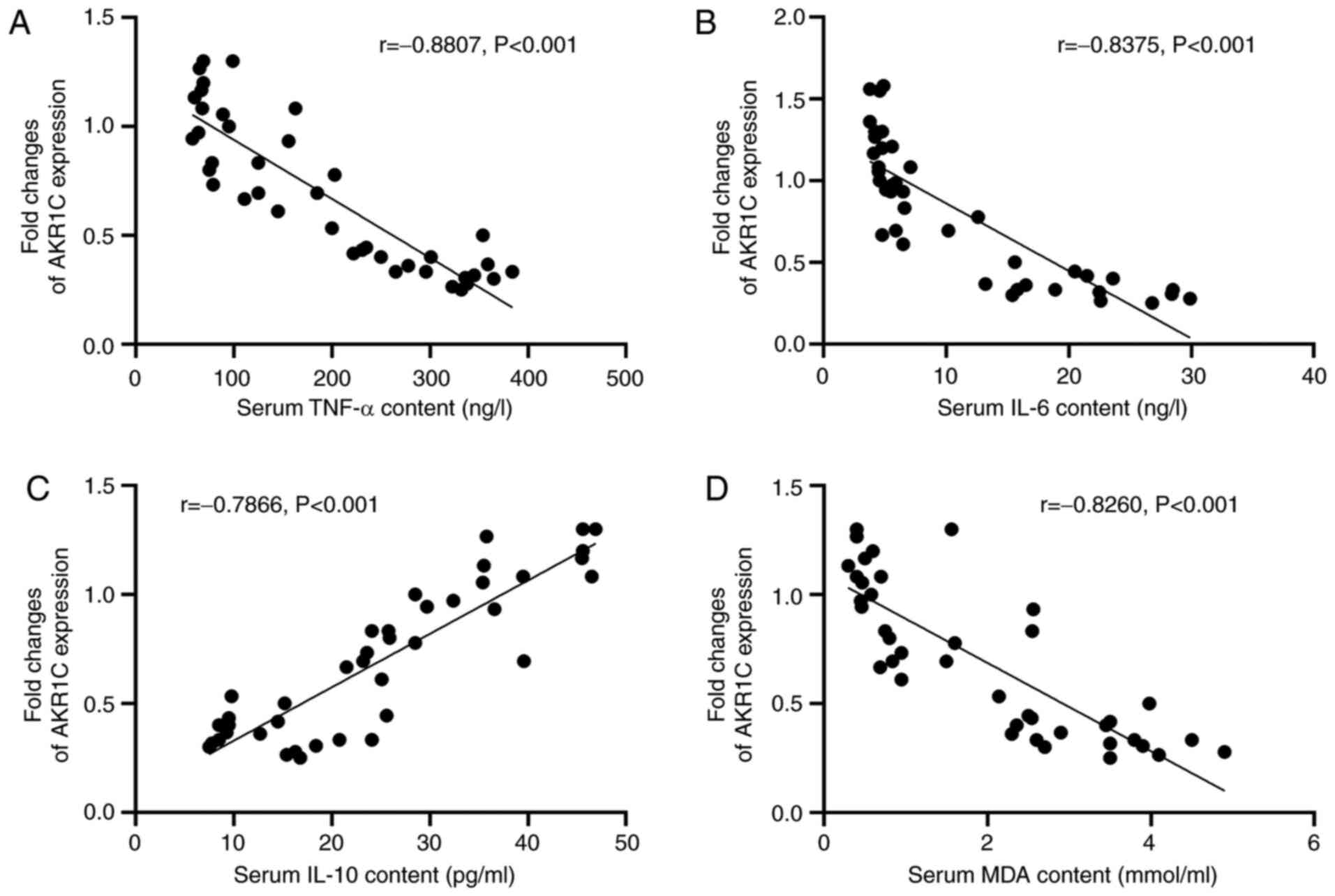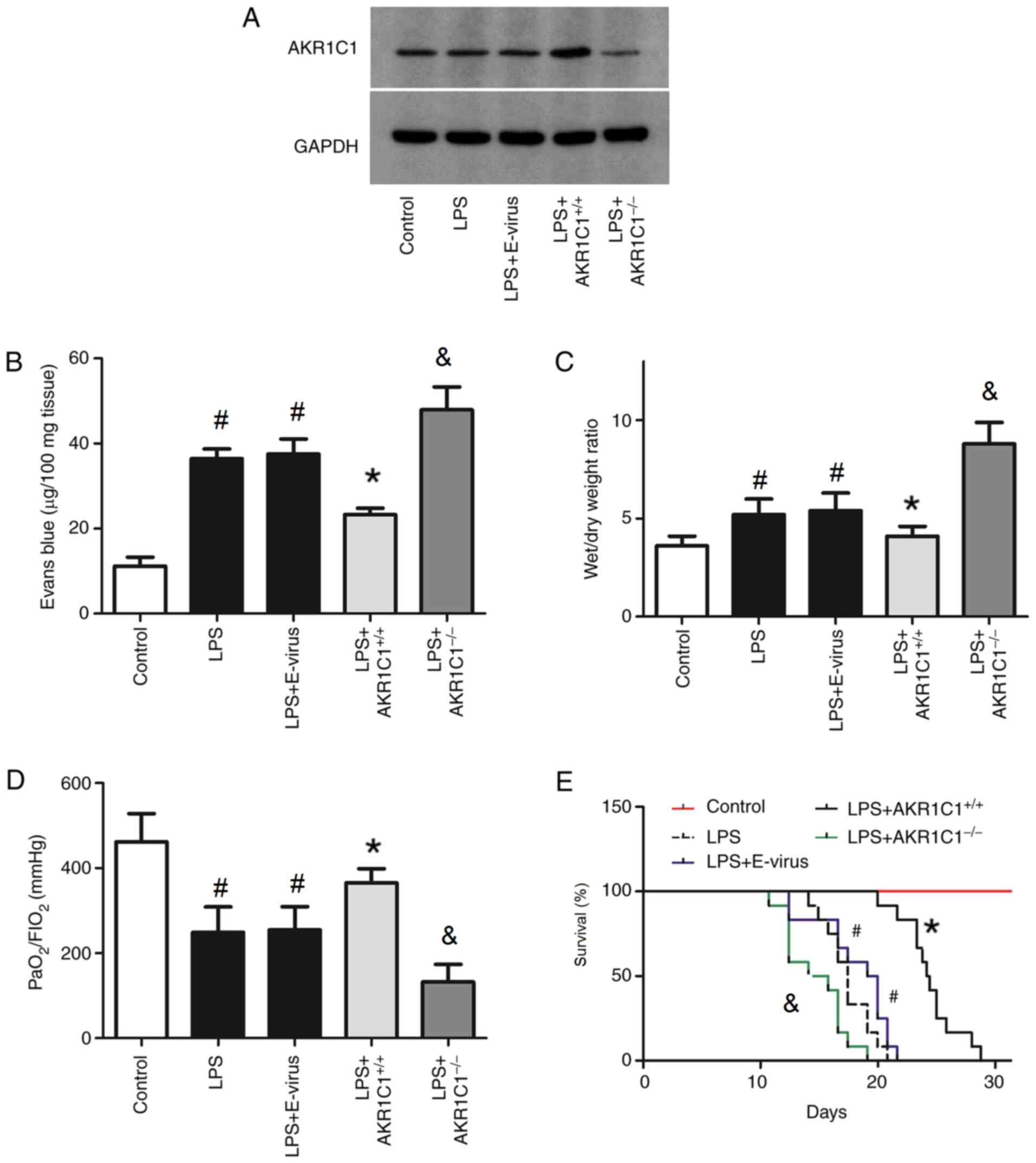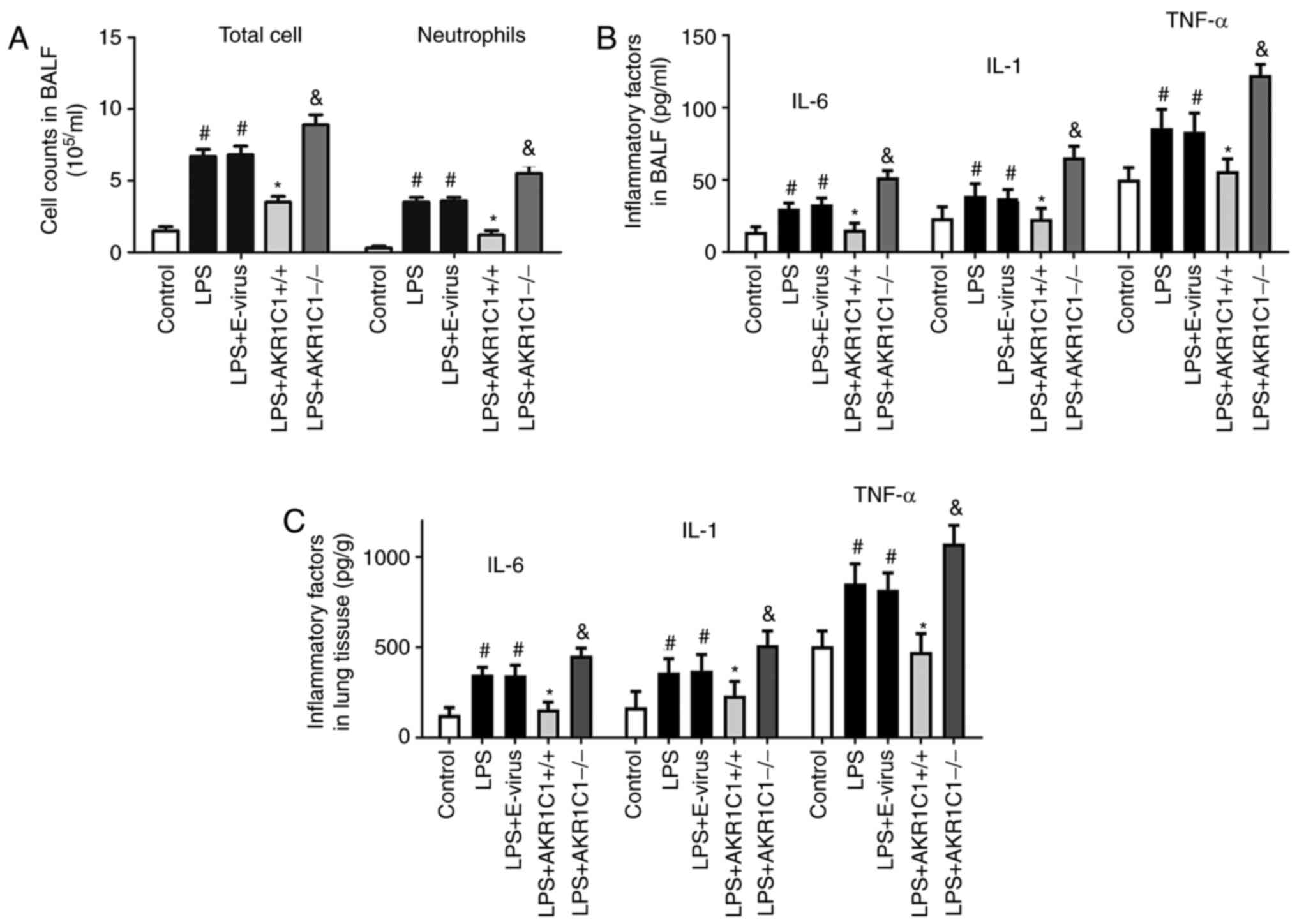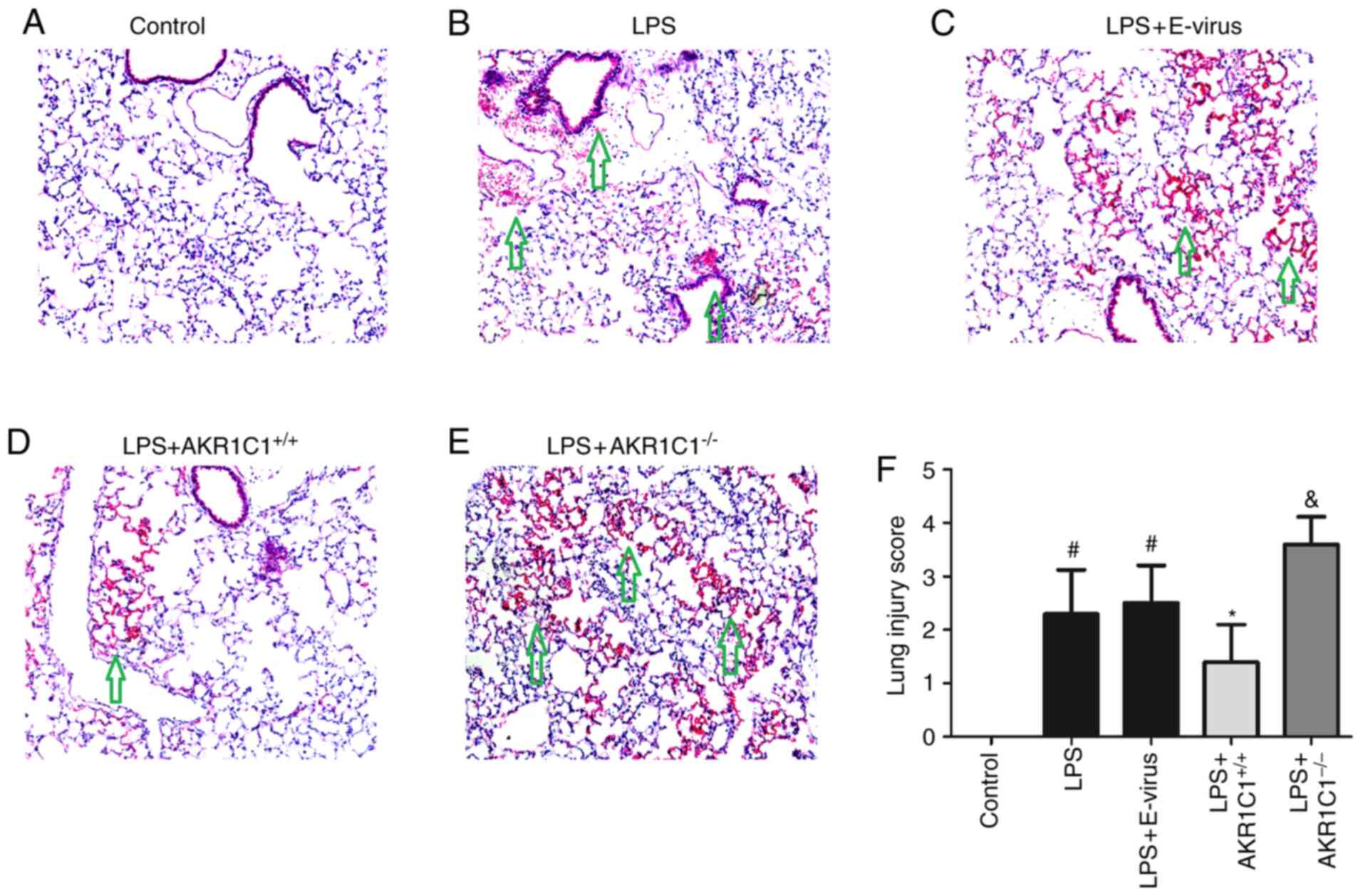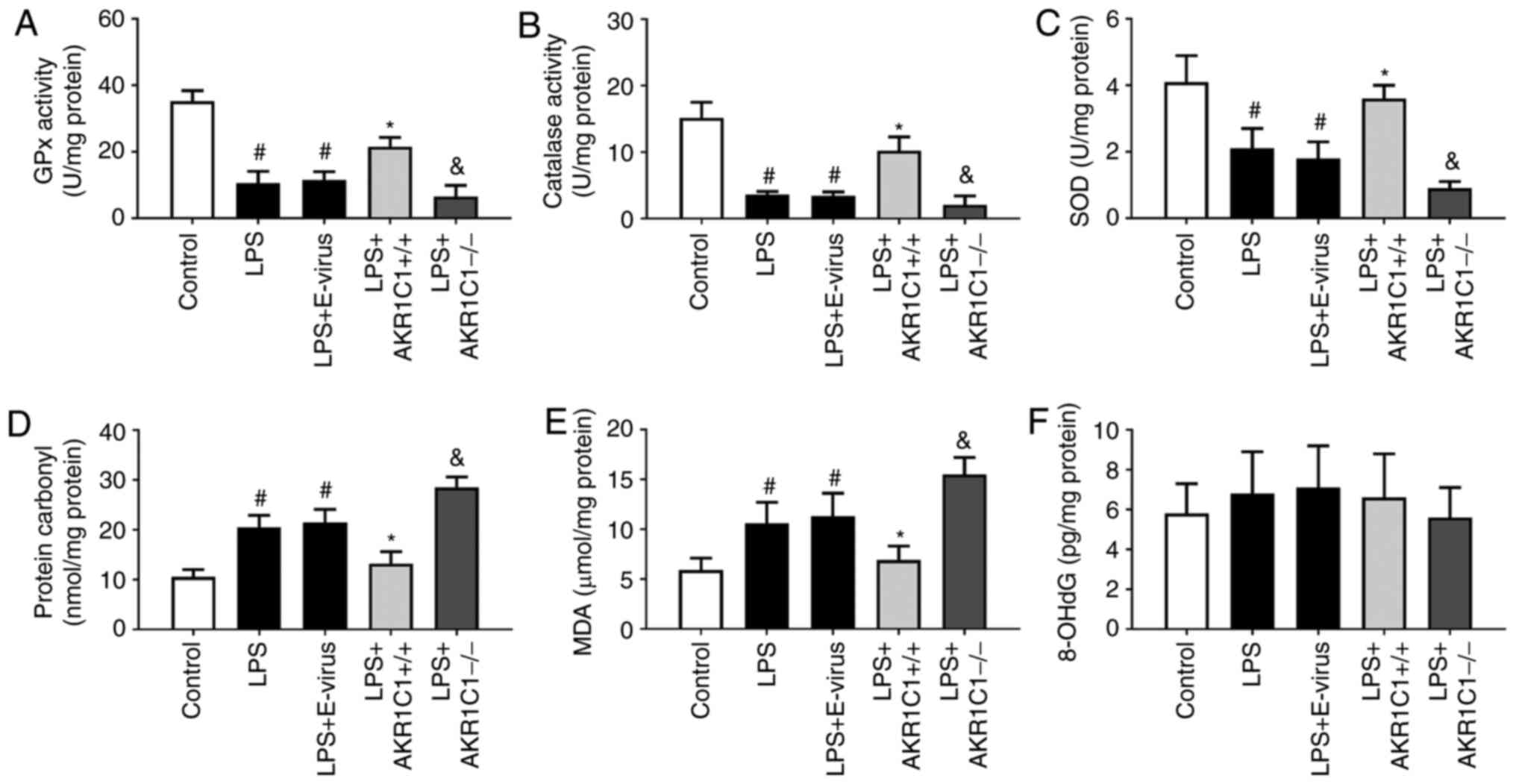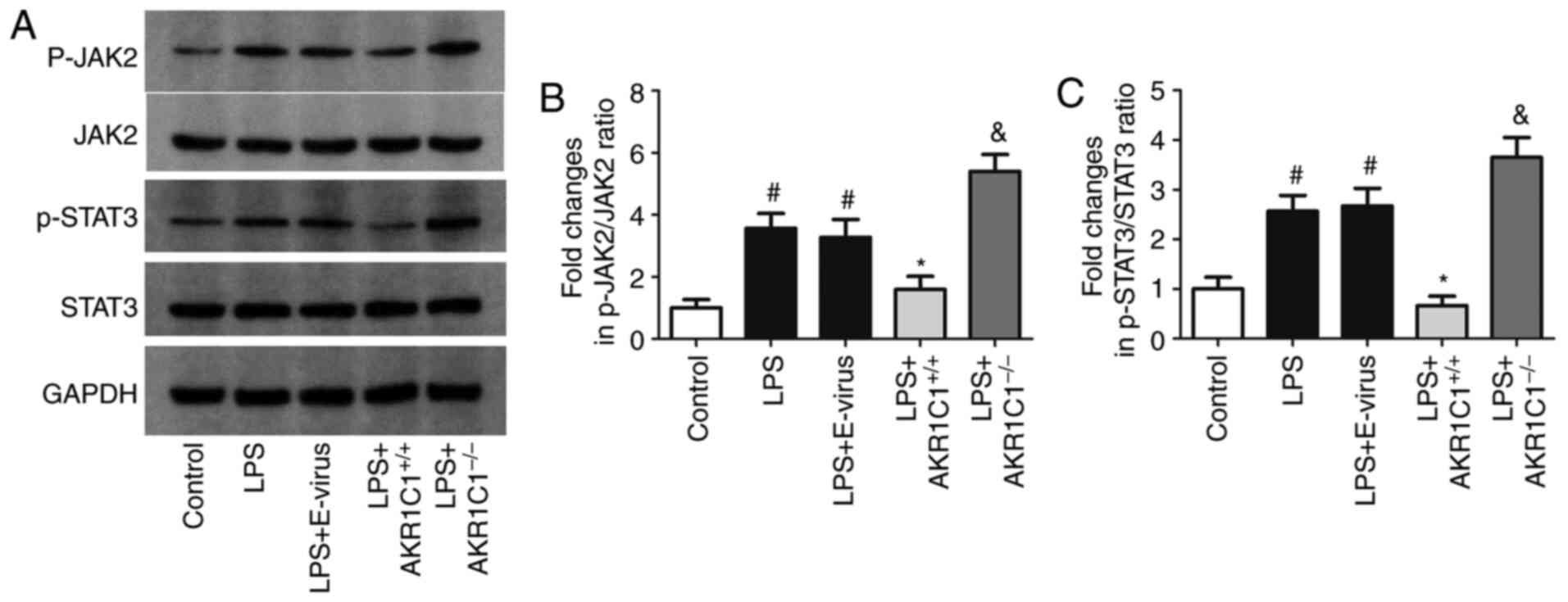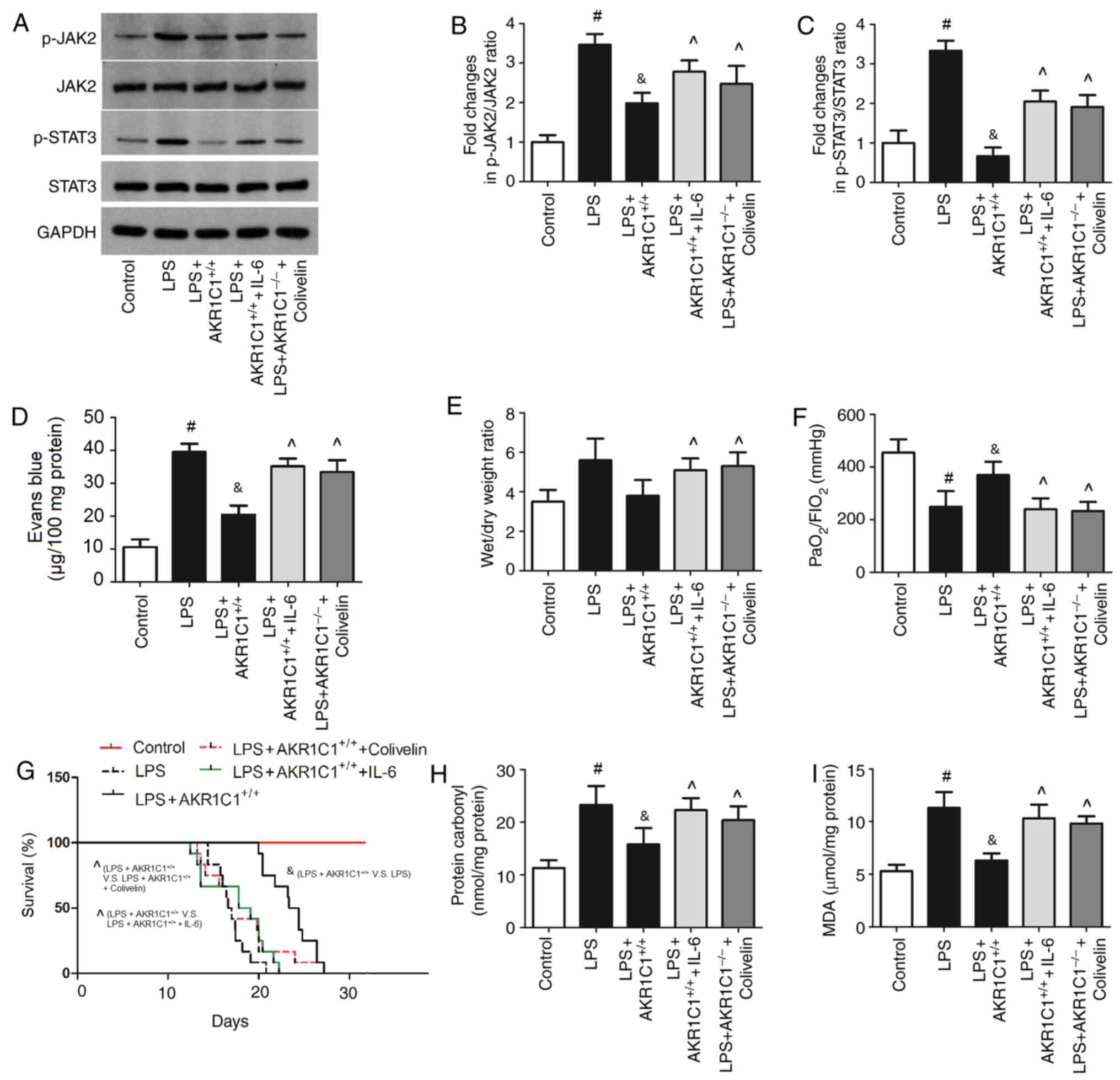|
1
|
Bosmann M, Grailer JJ, Ruemmler R,
Russkamp NF, Zetoune FS, Sarma JV, Standiford TJ and Ward PA:
Extracellular histones are essential effectors of C5aR- and
C5L2-mediated tissue damage and inflammation in acute lung injury.
FASEB J. 27:5010–5021. 2013. View Article : Google Scholar : PubMed/NCBI
|
|
2
|
Raghavendran K and Napolitano LM: ALI and
ARDS: Challenges and advances. Crit Care Clin. 27:xiii–xiv. 2011.
View Article : Google Scholar : PubMed/NCBI
|
|
3
|
Máca J, Jor O, Holub M, Sklienka P, Burša
F, Burda M, Janout V and Ševčík P: Past and present ARDS mortality
rates: A systematic review. Respir Care. 62:113–122. 2017.
View Article : Google Scholar : PubMed/NCBI
|
|
4
|
Yang Z, Zhang XR, Zhao Q, Wang SL, Xiong
LL, Zhang P, Yuan B, Zhang ZB, Fan SY, Wang TH, et al: Knockdown of
TNF α alleviates acute lung injury in rats with intestinal ischemia
and reperfusion injury by upregulating IL 10 expression. Int J Mol
Med. 42:926–934. 2018.PubMed/NCBI
|
|
5
|
Liu XW, Ma T, Cai Q, Wang L, Song HW and
Liu Z: Elevation of serum PARK7 and IL-8 levels is associated with
acute lung injury in patients with severe sepsis/septic shock. J
Intensive Care Med. 34:662–668. 2019. View Article : Google Scholar : PubMed/NCBI
|
|
6
|
Dhagat U, Endo S, Sumii R, Hara A and
El-Kabbani O: Selectivity determinants of inhibitor binding to
human 20 alpha-hydroxysteroid dehydrogenase: Crystal structure of
the enzyme in ternary complex with coenzyme and the potent
inhibitor 3,5-dichlorosalicylic acid. J Med Chem. 51:4844–4848.
2008. View Article : Google Scholar : PubMed/NCBI
|
|
7
|
Couture JF, Legrand P, Cantin L, Luu-The
V, Labrie F and Breton R: Human 20alpha-hydroxysteroid
dehydrogenase: Crystallographic and site-directed mutagenesis
studies lead to the identification of an alternative binding site
for C21-steroids. J Mol Biol. 331:593–604. 2003. View Article : Google Scholar : PubMed/NCBI
|
|
8
|
Rižner TL and Penning TM: Role of
aldo-keto reductase family 1 (AKR1) enzymes in human steroid
metabolism. Steroids. 79:49–63. 2014. View Article : Google Scholar : PubMed/NCBI
|
|
9
|
Rooney JP, Chorley B, Hiemstra S, Wink S,
Wang X, Bell DA, van de Water B and Corton JC: Mining a human
transcriptome database for chemical modulators of NRF2. PLoS One.
15:e02393672020. View Article : Google Scholar : PubMed/NCBI
|
|
10
|
Wang SS, Davis S, Cerhan JR, Hartge P,
Severson RK, Cozen W, Lan Q, Welch R, Chanock SJ and Rothman N:
Polymorphisms in oxidative stress genes and risk for non-Hodgkin
lymphoma. Carcinogenesis. 27:1828–1834. 2006. View Article : Google Scholar : PubMed/NCBI
|
|
11
|
Tian H, Li X, Jiang W, Lv C, Sun W, Huang
C and Chen R: High expression of AKR1C1 is associated with
proliferation and migration of small-cell lung cancer cells. Lung
Cancer (Auckl). 7:53–61. 2016.PubMed/NCBI
|
|
12
|
Zhu H, Hu Y, Zeng C, Chang L, Ge F, Wang
W, Yan F, Zhao Q, Cao J, Ying M, et al: The SIRT2-mediated
deacetylation of AKR1C1 is required for suppressing its
pro-metastasis function in non-small cell lung cancer.
Theranostics. 10:2188–2200. 2020. View Article : Google Scholar : PubMed/NCBI
|
|
13
|
Zhu H, Chang LL, Yan FJ, Hu Y, Zeng CM,
Zhou TY, Yuan T, Ying MD, Cao J, He QJ, et al: AKR1C1 activates
STAT3 to promote the metastasis of non-small cell lung cancer.
Theranostics. 8:676–692. 2018. View Article : Google Scholar : PubMed/NCBI
|
|
14
|
Wei X, Wei Z, Li Y, Tan Z and Lin C:
AKR1C1 contributes to cervical cancer progression via regulating
TWIST1 expression. Biochem Genet. 59:516–530. 2021. View Article : Google Scholar : PubMed/NCBI
|
|
15
|
Kellner M, Noonepalle S, Lu Q, Srivastava
A, Zemskov E and Black SM: ROS signaling in the pathogenesis of
acute lung injury (ALI) and acute respiratory distress syndrome
(ARDS). Adv Exp Med Biol. 967:105–137. 2017. View Article : Google Scholar : PubMed/NCBI
|
|
16
|
Zhang H, Sha J, Feng X, Hu X, Chen Y, Li B
and Fan H: Dexmedetomidine ameliorates LPS induced acute lung
injury via GSK 3β/STAT3 NF κB signaling pathway in rats. Int
Immunopharmacol. 74:1057172019. View Article : Google Scholar : PubMed/NCBI
|
|
17
|
Han X, Wang Y, Chen H, Zhang J, Xu C, Li J
and Li M: Enhancement of ICAM-1 via the JAK2/STAT3 signaling
pathway in a rat model of severe acute pancreatitis-associated lung
injury. Exp Ther Med. 11:788–796. 2016. View Article : Google Scholar : PubMed/NCBI
|
|
18
|
Hodgkins A, Farne A, Perera S, Grego T,
Parry-Smith DJ, Skarnes WC and Iyer V: WGE: A CRISPR database for
genome engineering. Bioinformatics. 31:3078–3080. 2015. View Article : Google Scholar : PubMed/NCBI
|
|
19
|
Oo ZM, Adlat S, Sah RK, Myint MZZ, Hayel
F, Chen Y, Htoo H, Bah FB, Bahadar N, Chan MK, et al: Brain
transcriptome study through CRISPR/Cas9 mediated mouse Dip2c gene
knock out. Gene. 758:1449752020. View Article : Google Scholar : PubMed/NCBI
|
|
20
|
Su ZQ, Mo ZZ, Liao JB, Feng XX, Liang YZ,
Zhang X, Liu YH, Chen XY, Chen ZW, Su ZR, et al: Usnic acid
protects LPS-induced acute lung injury in mice through attenuating
inflammatory responses and oxidative stress. Int Immunopharmacol.
22:371–378. 2014. View Article : Google Scholar : PubMed/NCBI
|
|
21
|
Nagata K, Masumoto K, Esumi G, Teshiba R,
Yoshizaki K, Fukumoto S, Nonaka K and Taguchi T: Connexin43 plays
an important role in lung development. J Pediatr Surg.
44:2296–2301. 2009. View Article : Google Scholar : PubMed/NCBI
|
|
22
|
Zhang X, Zhang M, Jiang M and Nong G:
Effect of IL 7 on Th17 cell responses in a mouse model of
neutrophilic asthma. Mol Med Rep. 22:1205–1212. 2020. View Article : Google Scholar : PubMed/NCBI
|
|
23
|
Zhang S, Jiang W, Ma L, Liu Y, Zhang X and
Wang S: Nrf2 transfection enhances the efficacy of human amniotic
mesenchymal stem cells to repair lung injury induced by
lipopolysaccharide. J Cell Biochem. 119:1627–1636. 2018. View Article : Google Scholar : PubMed/NCBI
|
|
24
|
Zhang Y, Li XJ, He RQ, Wang X, Zhang TT,
Qin Y, Zhang R, Deng Y, Wang HL, Luo DZ, et al: Upregulation of
HOXA1 promotes tumorigenesis and development of non small cell lung
cancer: A comprehensive investigation based on reverse
transcription-quantitative polymerase chain reaction and
bioinformatics analysis. Int J Oncol. 53:73–86. 2018.PubMed/NCBI
|
|
25
|
Livak KJ and Schmittgen TD: Analysis of
relative gene expression data using real-time quantitative PCR and
the 2(−ΔΔ C(T)) Method. Methods. 25:402–408. 2001. View Article : Google Scholar : PubMed/NCBI
|
|
26
|
Huerter ME, Sharma AK, Zhao Y, Charles EJ,
Kron IL and Laubach VE: Attenuation of pulmonary
ischemia-reperfusion injury by adenosine A2B receptor antagonism.
Ann Thorac Surg. 102:385–393. 2016. View Article : Google Scholar : PubMed/NCBI
|
|
27
|
Zhou F, Zhang Y, Chen J, Hu X and Xu Y:
Liraglutide attenuates lipopolysaccharide-induced acute lung injury
in mice. Eur J Pharmacol. 791:735–740. 2016. View Article : Google Scholar : PubMed/NCBI
|
|
28
|
Sharma P, Pandey R and Deshpande SB:
Indomethacin exacerbates oleic acid-induced acute respiratory
distress syndrome in adult rats. Indian J Physiol Pharmacol.
60:82–89. 2016.PubMed/NCBI
|
|
29
|
Ismail NA, Okasha SH, Dhawan A,
Abdel-Rahman AO, Shaker OG and Sadik NA: Antioxidant enzyme
activities in hepatic tissue from children with chronic cholestatic
liver disease. Saudi J Gastroenterol. 16:90–94. 2010. View Article : Google Scholar : PubMed/NCBI
|
|
30
|
Sarada SK, Dipti P, Anju B, Pauline T,
Kain AK, Sairam M, Sharma SK, Ilavazhagan G, Kumar D and
Selvamurthy W: Antioxidant effect of beta-carotene on hypoxia
induced oxidative stress in male albino rats. J Ethnopharmacol.
79:149–153. 2002. View Article : Google Scholar : PubMed/NCBI
|
|
31
|
Mindnich RD and Penning TM: Aldo-keto
reductase (AKR) superfamily: Genomics and annotation. Hum Genomics.
3:362–370. 2009. View Article : Google Scholar : PubMed/NCBI
|
|
32
|
El-Kabbani O, Dhagat U and Hara A:
Inhibitors of human 20α-hydroxysteroid dehydrogenase (AKR1C1). J
Steroid Biochem Mol Biol. 125:105–111. 2011. View Article : Google Scholar : PubMed/NCBI
|
|
33
|
Hsu NY, Ho HC, Chow KC, Lin TY, Shih CS,
Wang LS and Tsai CM: Overexpression of dihydrodiol dehydrogenase as
a prognostic marker of non-small cell lung cancer. Cancer Res.
61:2727–2731. 2001.PubMed/NCBI
|
|
34
|
Lin S, Wu H, Wang C, Xiao Z, Xu F and
Regulatory T: Regulatory T cells and acute lung injury: Cytokines,
uncontrolled inflammation, and therapeutic implications. Front
Immunol. 9:15452018. View Article : Google Scholar : PubMed/NCBI
|
|
35
|
Xiao M, Zhu T, Zhang W, Wang T, Shen YC,
Wan QF and Wen FQ: Emodin ameliorates LPS-induced acute lung
injury, involving the inactivation of NF-κB in mice. Int J Mol Sci.
15:19355–19368. 2014. View Article : Google Scholar : PubMed/NCBI
|
|
36
|
Ranieri VM, Rubenfeld GD, Thompson BT,
Ferguson ND, Caldwell E, Fan E, Camporota L and Slutsky AS; ARDS
Definition Task Force, : Acute respiratory distress syndrome: The
Berlin Definition. JAMA. 307:2526–2533. 2012.PubMed/NCBI
|
|
37
|
Thompson BT, Chambers RC and Liu KD: Acute
respiratory distress syndrome. N Engl J Med. 377:1904–1905. 2017.
View Article : Google Scholar : PubMed/NCBI
|
|
38
|
Thirunavukkarasu C, Watkins SC and Gandhi
CR: Mechanisms of endotoxin induced NO, IL 6, and TNF alpha
production in activated rat hepatic stellate cells: role of p38
MAPK. Hepatology. 44:389–398. 2006. View Article : Google Scholar : PubMed/NCBI
|
|
39
|
Fan E, Brodie D and Slutsky AS: Acute
respiratory distress syndrome: Advances in diagnosis and treatment.
JAMA. 319:698–710. 2018. View Article : Google Scholar : PubMed/NCBI
|
|
40
|
D'Alessio FR, Craig JM, Singer BD, Files
DC, Mock JR, Garibaldi BT, Fallica J, Tripathi A, Mandke P, Gans
JH, et al: Enhanced resolution of experimental ARDS through
IL-4-mediated lung macrophage reprogramming. Am J Physiol Lung Cell
Mol Physiol. 310:L733–L746. 2016. View Article : Google Scholar : PubMed/NCBI
|
|
41
|
Pun PB, Lu J and Moochhala S: Involvement
of ROS in BBB dysfunction. Free Radic Res. 43:348–364. 2009.
View Article : Google Scholar : PubMed/NCBI
|
|
42
|
Wang G, Han D, Zhang Y, Xie X, Wu Y, Li S
and Li M: A novel hypothesis: Up-regulation of HO-1 by activation
of PPARγ inhibits HMGB1-RAGE signaling pathway and ameliorates the
development of ALI/ARDS. J Thorac Dis. 5:706–710. 2013.PubMed/NCBI
|
|
43
|
Yang CY, Chen CS, Yiang GT, Cheng YL, Yong
SB, Wu MY and Li CJ: New insights into the immune molecular
regulation of the pathogenesis of acute respiratory distress
syndrome. Int J Mol Sci. 19:5882018. View Article : Google Scholar : PubMed/NCBI
|
|
44
|
Shaaban AA, El-Kashef DH, Hamed MF and
El-Agamy DS: Protective effect of pristimerin against LPS-induced
acute lung injury in mice. Int Immunopharmacol. 59:31–39. 2018.
View Article : Google Scholar : PubMed/NCBI
|
|
45
|
Balabanlı B and Balaban T: Investigation
into the effects of boron on liver tissue protein carbonyl, MDA,
and glutathione levels in endotoxemia. Biol Trace Elem Res.
167:259–263. 2015. View Article : Google Scholar : PubMed/NCBI
|
|
46
|
Burczynski ME, Sridhar GR, Palackal NT and
Penning TM: The reactive oxygen species- -and Michael
acceptor-inducible human aldo-keto reductase AKR1C1 reduces the
alpha, beta-unsaturated aldehyde 4-hydroxy-2-nonenal to
1,4-dihydroxy-2-nonene. J Biol Chem. 276:2890–2897. 2001.
View Article : Google Scholar : PubMed/NCBI
|
|
47
|
Zhang H, Neuhöfer P, Song L, Rabe B,
Lesina M, Kurkowski MU, Treiber M, Wartmann T, Regnér S, Thorlacius
H, et al: IL-6 trans-signaling promotes pancreatitis-associated
lung injury and lethality. J Clin Invest. 123:1019–1031. 2013.
View Article : Google Scholar : PubMed/NCBI
|
|
48
|
Yang L, Han S and Sun Y: An IL6-STAT3 loop
mediates resistance to PI3K inhibitors by inducing
epithelial-mesenchymal transition and cancer stem cell expansion in
human breast cancer cells. Biochem Biophys Res Commun. 453:582–587.
2014. View Article : Google Scholar : PubMed/NCBI
|
|
49
|
Cai B, Cai JP, Luo YL, Chen C and Zhang S:
The specific roles of JAK/STAT signaling pathway in sepsis.
Inflammation. 38:1599–1608. 2015. View Article : Google Scholar : PubMed/NCBI
|















